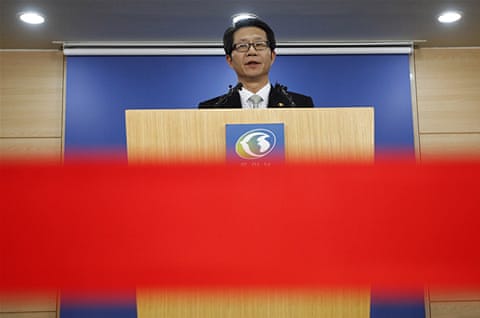South Korea has decided to withdraw the roughly 175 of its nationals stationed at Kaesong joint industrial zone after North Korea rejected Seoul’s offer to open formal talks on restarting operations at the complex, according to a senior official.
Seoul said on Friday it was worried about its workers not having access to food and medicine at the factory park that has been closed for nearly a month.
The statement by the country's Unification Minister Ryoo Kihl-jae raises a major question about the future of the last major symbol of inter-Korean cooperation as tensions remain high in the region.
The jointly run industrial zone located inside North Korea on the border with the South provides jobs to more than 50,000 North Koreans, who withdrew after their government decided to shut operations there.
Pyongyang's powerful National Defence Commission (NDC) earlier said Seoul's demand for working-level talks was deceptive and that ongoing US-South Korean military drills and the spreading of anti-North Korea leaflets at the border were proof of Seoul's insincerity.
Seoul on Thursday had given the North 24 hours to agree to formal negotiations on the Kaesong complex, warning of unspecified "significant measures" if Pyongyang declined.
"If the South Korean puppet force continues to aggravate the situation, it would be up to us to take any final and decisive grave measures," South's Yonhap news agency cited the NDC statement as saying.
'Military' contingency
Pyongyang suspended operations on April 9 because it was angered by the South's "military" contingency plan to protect its staff at the site.
The Korean peninsula was already engulfed in a cycle of escalating tensions, triggered by the North's nuclear test in February that prompted UN sanctions.
Ever since the fresh sanctions, North's young leader Kim Jong-un has been berating its southern neighbour and threatened its ally, the US, of nuclear attack.
Tensions are still high amid reports that Pyongyang has moved more missile launchers to its east coast.
The latest developments come as two months of joint military exercises between the US and South Korea are starting to wrap up.
The South Korean firms that usually operate at the Kaesong complex, was established in 2004, have vowed to remain and fight to defend their investment whatever Seoul's decision be.
"We've decided to protect Kaesong Industrial Complex no matter what difficulties we may face," said a spokesman for the South Korean companies, Ok Sung-seok.
But the number of South Korean workers has drastically come down to 176 from about 850.
The North's decision to suspend operations was unexpected.
Neither of the Koreas has allowed previous crises to significantly affect the complex, which is a valued source of hard currency for the impoverished North and seen as a bellwether of stability on the Korean peninsula.
Original Article
Source: aljazeera.com
Author: --
Seoul said on Friday it was worried about its workers not having access to food and medicine at the factory park that has been closed for nearly a month.
The statement by the country's Unification Minister Ryoo Kihl-jae raises a major question about the future of the last major symbol of inter-Korean cooperation as tensions remain high in the region.
The jointly run industrial zone located inside North Korea on the border with the South provides jobs to more than 50,000 North Koreans, who withdrew after their government decided to shut operations there.
Pyongyang's powerful National Defence Commission (NDC) earlier said Seoul's demand for working-level talks was deceptive and that ongoing US-South Korean military drills and the spreading of anti-North Korea leaflets at the border were proof of Seoul's insincerity.
Seoul on Thursday had given the North 24 hours to agree to formal negotiations on the Kaesong complex, warning of unspecified "significant measures" if Pyongyang declined.
"If the South Korean puppet force continues to aggravate the situation, it would be up to us to take any final and decisive grave measures," South's Yonhap news agency cited the NDC statement as saying.
'Military' contingency
Pyongyang suspended operations on April 9 because it was angered by the South's "military" contingency plan to protect its staff at the site.
The Korean peninsula was already engulfed in a cycle of escalating tensions, triggered by the North's nuclear test in February that prompted UN sanctions.
Ever since the fresh sanctions, North's young leader Kim Jong-un has been berating its southern neighbour and threatened its ally, the US, of nuclear attack.
Tensions are still high amid reports that Pyongyang has moved more missile launchers to its east coast.
The latest developments come as two months of joint military exercises between the US and South Korea are starting to wrap up.
The South Korean firms that usually operate at the Kaesong complex, was established in 2004, have vowed to remain and fight to defend their investment whatever Seoul's decision be.
"We've decided to protect Kaesong Industrial Complex no matter what difficulties we may face," said a spokesman for the South Korean companies, Ok Sung-seok.
But the number of South Korean workers has drastically come down to 176 from about 850.
The North's decision to suspend operations was unexpected.
Neither of the Koreas has allowed previous crises to significantly affect the complex, which is a valued source of hard currency for the impoverished North and seen as a bellwether of stability on the Korean peninsula.
Original Article
Source: aljazeera.com
Author: --

No comments:
Post a Comment